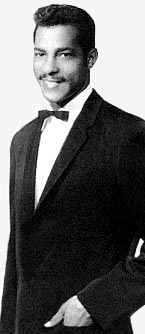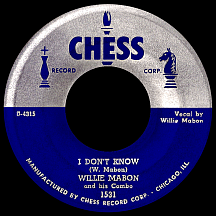WILLIE MABON
I Don't Know
He was a well-groomed, sharply-dressed piano-man-about-town. The way he communicated on his best-known songs, on the other hand, was tough, streetwise and scornful. Willie Mabon grew up in the Hollywood district on the north end of Memphis, Tennessee; moving to Chicago in 1942, he set out to show off his formidable piano and harmonica playing skills, but a stint in the Marines during World War II interrupted his plans. Returning at the end of the war in time for his 20th birthday, Willie made connections with other musicians and by 1947 had formed a trio, Blues Rockers, with guitarists Lazy Bill Lucas and Earl Dranes. Two 78s appeared on Aristocrat in 1949 and '50, the first, "Times Are Getting Hard," leading into its follow-up, "When Times Are Getting Better." The group made the rounds of Windy City clubs for the next couple of years before Mabon embarked on a solo career. Lucas and Dranes, or "Earley Dranne" as he was later identified, continued as the Blues Rockers and had a single on Excello in 1955, "Calling All Cows."
Mabon's manager, Chicago radio personality Al Benson, started Parrot Records and waxed two tracks with the singer in the fall of 1952. The A side, "I Don't Know," was adapted from "Strut That Thing," a 1935 recording on Vocalion by Cripple Clarence Lofton and "I Don't Know," Lofton's reworking of the song for the Solo Art label about four years later. Willie slowed the tempo considerably from Lofton's fast-paced piano-pulsating original while utilizing the more vicious parts of the lyrics: 'I'm gettin' sick and tired of the way you do...good kind papa gotta poison you...sprinkle goofer dust all around your bed...wake up one of these mornings find your own self dead!,' then added an extra touch: 'She said you shouldn't say that!' Spoken: 'I said what should I say this time, baaay-bee??' Benson had the record pressed on Parrot but quickly sold the master to Chess...and it took off like nothing else in the company's nearly three year history. Hitting number one on the rhythm and blues chart at the end of December, the single (which gave no credit to Lofton as composer) remained on top eight weeks...and suddenly people were elongating the word "baby" in everyday conversation.
"Tennessee" Ernie Ford took notice and put out a country cover of "I Don't Know" without the violence ('One-a these days I'll be leavin' you' will do, thank you!), but it failed to click. An answer song (throwing Willie's attitude back at him in a less brutal way) appeared in early '53; Linda Hayes' "Yes! I Know (What You're Putting Down)" on the Recorded in Hollywood label was a big hit, quickly jumping to number three in February behind Willie's chart-topper, while King Records diva Annisteen Allen did the same song, titled simply "Yes I Know," as the B side of a similarly-conceived retort to The Five Royales' smash "Baby Don't Do It" ("Baby I'm Doin' It" was the obvious title and the hit side). Around this time a single by Mabon under the name Big Willie popped up on Apollo; "Bogey Man" was a smooth blues jam with prominent harmonica playing, recorded solo in 1949 during his time with the Blues Rockers.

While all these singers were scrambling, Willie was busy constructing his next hit, recorded and released within weeks of the moment the Royales' disc knocked him off the top spot. "I'm Mad" had a tone similar to its predecessor, but Mabon allowed the tables to be turned on himself: 'Asked my baby could she stand to see me cry...she said yes, I could stand to see you buried alive!...I'm mad!...you done me wrong this time, baaay-bee...I'm mad!...and you have the nerve to try to be glad'...ouch. Relationships! Apparently it was difficult to align them properly. Willie's angry anecdote took him back to number one R&B for two weeks in May. He reprised with a soundalike, "You're a Fool," injected more energy (and a bigger band sound) into "I Got to Go" and returned to the formula with Willie Dixon's "Would You Baby?," no-shows all.
"Poison Ivy" had a much different feel than the humorous and better known like-titled 1959 hit by The Coasters. It figures Mabon's musical subject matter, so at odds with his debonair in-person image, would return him to favor with fans of things rough and tumble. He landed in the R&B top ten again in late '54 with this charming threat to any man still breathing: 'Last night some cat got smart with my niece...now he wears a sign saying rest in peace!' I guess Willie wasn't hesitant to scuff up his stylish new suit: 'I'm like poison ivy, I'll break out all over you!' Another of what wound up being nine Chess singles didn't chart but has become a well-known standard. Dixon's "The Seventh Son" (...in the whole round world there is only one!') was introduced by Mabon and has since been recorded by dozens of artists. Among the best-known versions are Mose Allison's 1960 jazz rendition and Johnny Rivers' 1965 "Whisky a Go Go" remake.
A legitimate beef over petty-cash-drawer-type royalty payments resulted in his departure from Chess in 1956. He figured he couldn't do any worse anywhere else...yet there was only one single for Federal ("Light Up Your Lamp"), followed after a two-year wait by a pair on the oddball Mad label, then one on Solar and two on Formal. Live performances were his main source of income and a contract with U.S.A. Records from '62 to '65 provided some stability (as it did for other artists on the upstart Chicago company's blues-heavy roster). He and Willie Dixon enjoyed working together on several well-produced tracks, standouts being "Just Got Some," "I'm the Fixer," instrumental "Harmonica Special" and piano blues lament "Lonesome Blue Water."
Willie stopped making music for a few years in the late '60s, then returned to the scene of his greatest success and frustration in 1969, long enough to get one single out on Checker, "I'll Keep on Hurtin'." A remake of "Poison Ivy" was issued on the Blues on Blues label in '72. He toured for several years, helping spark a revival of interest in his early hits, but died in Paris, France in 1985 at the age of 59. Willie Mabon's status has been far overshadowed by the more familiar stars of the 1950s Chess empire (Muddy Waters, Howlin' Wolf, Little Walter, Chuck Berry, Bo Diddley), but one fact can't be changed: "I Don't Know" was one of the legendary Chicago label's all-time biggest hits.


